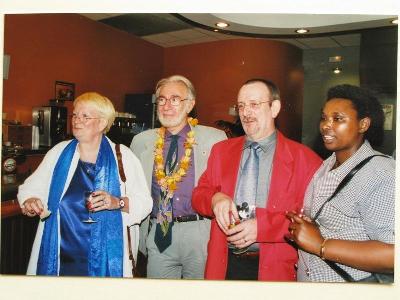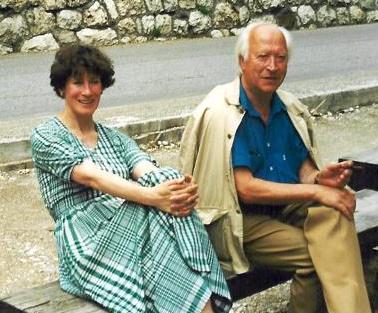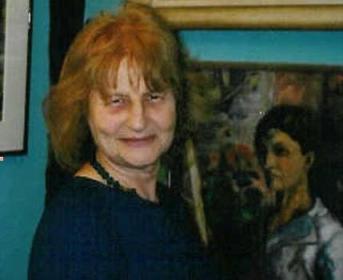Stories
UN Declaration and Programme of Action for a Culture of Peace
Personalities in the "culture of peace bed"
The 90's were a difficult time for my marriage with Lindsay. For the first half of the decade I lived alone in a tiny sixth-floor maid's chamber of the Mokobodzkis in Passy. And in the second half of the decade Lindsay and I rented a very nice apartment on rue du Champs de Mars with views of the Eiffel Tower one direction, the Fontenoy headquarters of UNESCO a second direction, and Montmartre in a third direction.
During these years I started seeing other women. I kept this part of my life secret in order to preserve my marriage with Lindsay. It was a great error. First of all, it totally contradicted my belief in transparency, which I had first developed as a scientist and then later expanded as an integral aspect of the culture of peace. And perhaps most important, I was to pay dearly for this, as it was extremely hurtful to Lindsay when I eventually told her in 2009 that I had been unfaithful all those years.
Most notable among the women was Kiki Chauvin whom I had met at a party to celebrate the 1993 Arusha Accords which provided a ray of hope for Burundi and Rwanda at that time. Nestor had told me about the party, where there was wonderful music and dancing by many from the diaspora African population in Paris. Kiki managed a foyer of the Postal Service, and because one of the tenants was a postal worker from Burundi she hosted the party in the main hall of the foyer.

Kiki (on left) and her brother at my goodbye party when I retired from UNESCO
Although I was attracted by Kiki who was the life of the party, I was put off by the fact that she was married and I took up instead with her good friend Christianne. That lasted about six months before she broke it off, realizing that I was not about to leave Lindsay. It was a few years later and after the death of Kiki's husband that we began seeing each other in secret when Lindsay was on one of her frequent visits back to the States, and even sometimes when I took a long lunch hour.
Kiki and I shared a love and fascination for art and the origins of things. When I first visited her apartment she found me examining the fossils that she had collected and artifacts from Africa and Oceania. And when I admired a watercolor she had made of a small boat in a pond, she generously offered it to me as a present. My first present to her was a richly illustrated book of ancient cave art from around the world. Later, on her last trip with her husband, she sent me a postcard with a beautiful view of the lush rainforest of Reunion, which became a shared passion for us in later years.
It seemed that we would say goodbye when I returned with Lindsay to the States after my retirement from UNESCO in 2001, and I wrote her a poem at that time about escaping from the cage of our frustrations. However, over time as the let-down set in from the end of the UNESCO experience, I started to see her again and share with her the missions that I took around the world.
Another woman in my life during the years in Paris was my UNESCO colleague Christine. We had met when I first arrived to live in Paris and we were neighbors on the 15th floor of the Miollis building of UNESCO, where I had the most spectacular office in the organization, the big corner office with huge windows overlooking all of Paris. In the poem that I wrote her at that time, I refer to the clouds passing by those windows, as well as the many languages and poetries that we shared. My Page Poem book has other poems to her.

Christine with her cousin Josef
From the beginning Christine and I we found many interests in common. I was fascinated the first evening we spent together when she recounted her years in Chile where she managed a ranch high in the mountains. At that time she had been married to a man who had established the ranch as an experiment in sustainable development, long before the concept was in vogue. Once, as she recalled, a mountain lion had strolled through the open doors of the house and she had faced it alone. It looked at her and continued walking through the house and went out the other door. At various times in her life she had studied and/or taught literature, architecture, business administration, landscaping, and we shared passions for poetry, classical art and music and the medieval architecture of France.
Unlike the situation with Kiki, Christine was friends with Lindsay and there was not the same problem of lack of transparency.
Another woman I should mention is Perel Wilgowicz, a psychoanalyst who lived in the Marais. We would often have lunch to discuss the megalomania of my boss, Federico Mayor, which made my life difficult at UNESCO.

Perel in front of a painting from an exhibition she hosted at her aparment
 |
Stages
1986-1992
Fall of Soviet Empire
1992-1997
UNESCO Culture of Peace Programme